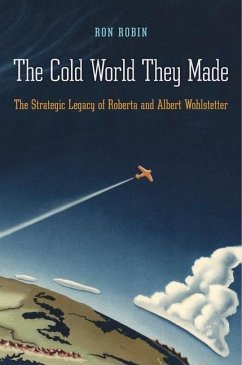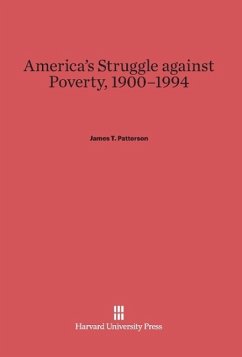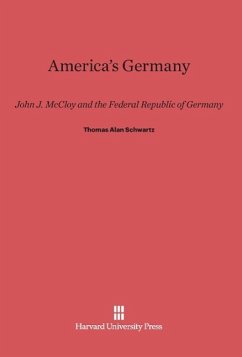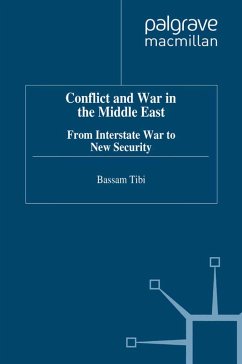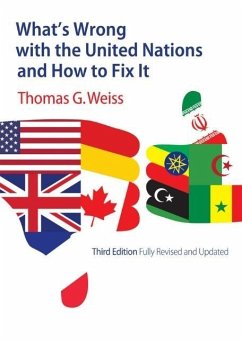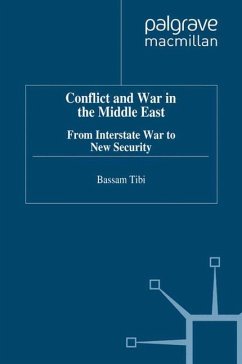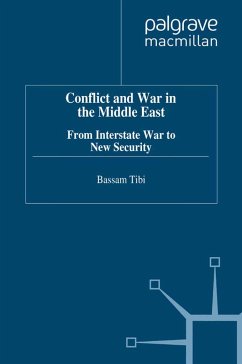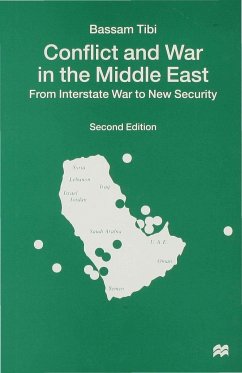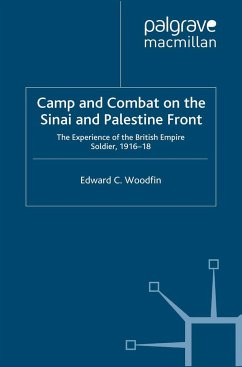
Osamah F. Khalil
Gebundenes Buch
America's Dream Palace
Middle East Expertise and the Rise of the National Security State
Versandkostenfrei!
Versandfertig in über 4 Wochen

PAYBACK Punkte
20 °P sammeln!





As the postwar U.S. national security establishment required Middle Eastern expertise, it cultivated a beneficial relationship with universities. But by the time the Bush administration declared its Global War on Terror, Osamah Khalil shows, think tank agendas aligned with neoconservative goals were the drivers of America's foreign policy.
Osamah F. Khalil
Produktdetails
- Verlag: De Gruyter
- Seitenzahl: 440
- Erscheinungstermin: 17. Oktober 2016
- Englisch
- Abmessung: 241mm x 164mm x 43mm
- Gewicht: 782g
- ISBN-13: 9780674971578
- ISBN-10: 0674971574
- Artikelnr.: 44947108
Herstellerkennzeichnung
Libri GmbH
Europaallee 1
36244 Bad Hersfeld
gpsr@libri.de
America's Dream Palace offers a wide-ranging exploration of the complex relationship between the knowledge that Americans have produced about the Middle East and the exercise of American power in the region, from the First World War down to the invasion of Iraq. Well-researched and engagingly written, it should be of interest to scholars and nonscholars alike.
-- Zachary Lockman, author of Field Notes: The Making of Middle East Studies in the United States
America's Dream Palace is a brilliant and meticulously researched work. Khalil carefully documents how scholars' production of knowledge about the Middle East shaped, and was shaped by, the rise of America as a twentieth-century global military power. This is a vital
-- Zachary Lockman, author of Field Notes: The Making of Middle East Studies in the United States
America's Dream Palace is a brilliant and meticulously researched work. Khalil carefully documents how scholars' production of knowledge about the Middle East shaped, and was shaped by, the rise of America as a twentieth-century global military power. This is a vital
Mehr anzeigen
contribution to our understanding of Middle East studies and to our understanding of the political economy of knowledge production.
-- David H. Price, author of Cold War Anthropology: The CIA, The Pentagon, and the Rise of Dual Use Anthropology
Thoroughly documented, carefully argued, and well crafted. In a detailed look at the nexus of American academic expertise on the Middle East and Washington's diplomatic and intelligence power centers, from the Wilson era through the Obama presidency, Khalil keeps his prose crisp and his judgments sober.
-- John Waterbury Foreign Affairs
Khalil provides a trove of new data, especially about the pre-Cold War and post-2001 eras, [but] his interest isn't so much the history of ideas as the institutional career of Middle East studies in America. He's particularly good at piecing together scattered archival evidence to reveal previously hidden patronage relationships between area specialists and government agencies such as the State Department and the CIA. And by quoting one undeniably prejudiced statement after another, he demonstrates the Orientalism of successive generations of Middle East experts to devastating overall effect.
-- Hugh Wilford London Review of Books
In this timely study, Khalil provides a thorough analysis of how U.S. foreign policy interests have driven the development of American specialist knowledge about the Middle East from WWI to today...Khalil demonstrates how American analysis of the Middle East has been, and continues to be, tainted with the ideology of American exceptionalism and orientalist notions of the region's political and cultural immaturities and deformities, even today.
-- Publishers Weekly
Well-researched and containing a breadth of sources, America's Dream Palace provides the reader an in-depth treatment of the history of Middle Eastern Studies in the U.S.
-- David Max Korzen Arab Studies Quarterly
Khalil's America's Dream Palace is a well-researched study of the evolution of knowledge about the Middle East over the course of a century...[An] excellent study of an unusual aspect of the Cold War as it relates to the Middle East...[It] constitute[s] required reading for the student of the Middle East and thelayman interested in the region alike.
-- Juan Romero Reviews in American History
[Khalil's] extensive use of archival sources, sharp prose, bold assertions and arguments makes America's Dream Palace a timely and unique addition to the emerging scholarship on the U.S. and the Middle East during the Cold War and beyond.
-- Jeffrey G. Karam H-Diplo
-- David H. Price, author of Cold War Anthropology: The CIA, The Pentagon, and the Rise of Dual Use Anthropology
Thoroughly documented, carefully argued, and well crafted. In a detailed look at the nexus of American academic expertise on the Middle East and Washington's diplomatic and intelligence power centers, from the Wilson era through the Obama presidency, Khalil keeps his prose crisp and his judgments sober.
-- John Waterbury Foreign Affairs
Khalil provides a trove of new data, especially about the pre-Cold War and post-2001 eras, [but] his interest isn't so much the history of ideas as the institutional career of Middle East studies in America. He's particularly good at piecing together scattered archival evidence to reveal previously hidden patronage relationships between area specialists and government agencies such as the State Department and the CIA. And by quoting one undeniably prejudiced statement after another, he demonstrates the Orientalism of successive generations of Middle East experts to devastating overall effect.
-- Hugh Wilford London Review of Books
In this timely study, Khalil provides a thorough analysis of how U.S. foreign policy interests have driven the development of American specialist knowledge about the Middle East from WWI to today...Khalil demonstrates how American analysis of the Middle East has been, and continues to be, tainted with the ideology of American exceptionalism and orientalist notions of the region's political and cultural immaturities and deformities, even today.
-- Publishers Weekly
Well-researched and containing a breadth of sources, America's Dream Palace provides the reader an in-depth treatment of the history of Middle Eastern Studies in the U.S.
-- David Max Korzen Arab Studies Quarterly
Khalil's America's Dream Palace is a well-researched study of the evolution of knowledge about the Middle East over the course of a century...[An] excellent study of an unusual aspect of the Cold War as it relates to the Middle East...[It] constitute[s] required reading for the student of the Middle East and thelayman interested in the region alike.
-- Juan Romero Reviews in American History
[Khalil's] extensive use of archival sources, sharp prose, bold assertions and arguments makes America's Dream Palace a timely and unique addition to the emerging scholarship on the U.S. and the Middle East during the Cold War and beyond.
-- Jeffrey G. Karam H-Diplo
Schließen
America's Dream Palace offers a wide-ranging exploration of the complex relationship between the knowledge that Americans have produced about the Middle East and the exercise of American power in the region, from the First World War down to the invasion of Iraq. Well-researched and engagingly written, it should be of interest to scholars and nonscholars alike.
-- Zachary Lockman, author of Field Notes: The Making of Middle East Studies in the United States
America's Dream Palace is a brilliant and meticulously researched work. Khalil carefully documents how scholars' production of knowledge about the Middle East shaped, and was shaped by, the rise of America as a twentieth-century global military power.
-- Zachary Lockman, author of Field Notes: The Making of Middle East Studies in the United States
America's Dream Palace is a brilliant and meticulously researched work. Khalil carefully documents how scholars' production of knowledge about the Middle East shaped, and was shaped by, the rise of America as a twentieth-century global military power.
Mehr anzeigen
This is a vital contribution to our understanding of Middle East studies and to our understanding of the political economy of knowledge production.
-- David H. Price, author of Cold War Anthropology: The CIA, The Pentagon, and the Rise of Dual Use Anthropology
Thoroughly documented, carefully argued, and well crafted. In a detailed look at the nexus of American academic expertise on the Middle East and Washington's diplomatic and intelligence power centers, from the Wilson era through the Obama presidency, Khalil keeps his prose crisp and his judgments sober.
-- John Waterbury Foreign Affairs
Khalil provides a trove of new data, especially about the pre-Cold War and post-2001 eras, [but] his interest isn't so much the history of ideas as the institutional career of Middle East studies in America. He's particularly good at piecing together scattered archival evidence to reveal previously hidden patronage relationships between area specialists and government agencies such as the State Department and the CIA. And by quoting one undeniably prejudiced statement after another, he demonstrates the Orientalism of successive generations of Middle East experts to devastating overall effect.
-- Hugh Wilford London Review of Books
In this timely study, Khalil provides a thorough analysis of how U.S. foreign policy interests have driven the development of American specialist knowledge about the Middle East from WWI to today...Khalil demonstrates how American analysis of the Middle East has been, and continues to be, tainted with the ideology of American exceptionalism and orientalist notions of the region's political and cultural immaturities and deformities, even today.
-- Publishers Weekly
Well-researched and containing a breadth of sources, America's Dream Palace provides the reader an in-depth treatment of the history of Middle Eastern Studies in the U.S.
-- David Max Korzen Arab Studies Quarterly
Khalil's America's Dream Palace is a well-researched study of the evolution of knowledge about the Middle East over the course of a century...[An] excellent study of an unusual aspect of the Cold War as it relates to the Middle East...[It] constitute[s] required reading for the student of the Middle East and the layman interested in the region alike.
-- Juan Romero Reviews in American History
[Khalil's] extensive use of archival sources, sharp prose, bold assertions and arguments makes America's Dream Palace a timely and unique addition to the emerging scholarship on the U.S. and the Middle East during the Cold War and beyond.
-- Jeffrey G. Karam H-Diplo
-- David H. Price, author of Cold War Anthropology: The CIA, The Pentagon, and the Rise of Dual Use Anthropology
Thoroughly documented, carefully argued, and well crafted. In a detailed look at the nexus of American academic expertise on the Middle East and Washington's diplomatic and intelligence power centers, from the Wilson era through the Obama presidency, Khalil keeps his prose crisp and his judgments sober.
-- John Waterbury Foreign Affairs
Khalil provides a trove of new data, especially about the pre-Cold War and post-2001 eras, [but] his interest isn't so much the history of ideas as the institutional career of Middle East studies in America. He's particularly good at piecing together scattered archival evidence to reveal previously hidden patronage relationships between area specialists and government agencies such as the State Department and the CIA. And by quoting one undeniably prejudiced statement after another, he demonstrates the Orientalism of successive generations of Middle East experts to devastating overall effect.
-- Hugh Wilford London Review of Books
In this timely study, Khalil provides a thorough analysis of how U.S. foreign policy interests have driven the development of American specialist knowledge about the Middle East from WWI to today...Khalil demonstrates how American analysis of the Middle East has been, and continues to be, tainted with the ideology of American exceptionalism and orientalist notions of the region's political and cultural immaturities and deformities, even today.
-- Publishers Weekly
Well-researched and containing a breadth of sources, America's Dream Palace provides the reader an in-depth treatment of the history of Middle Eastern Studies in the U.S.
-- David Max Korzen Arab Studies Quarterly
Khalil's America's Dream Palace is a well-researched study of the evolution of knowledge about the Middle East over the course of a century...[An] excellent study of an unusual aspect of the Cold War as it relates to the Middle East...[It] constitute[s] required reading for the student of the Middle East and the layman interested in the region alike.
-- Juan Romero Reviews in American History
[Khalil's] extensive use of archival sources, sharp prose, bold assertions and arguments makes America's Dream Palace a timely and unique addition to the emerging scholarship on the U.S. and the Middle East during the Cold War and beyond.
-- Jeffrey G. Karam H-Diplo
Schließen
Für dieses Produkt wurde noch keine Bewertung abgegeben. Wir würden uns sehr freuen, wenn du die erste Bewertung schreibst!
Eine Bewertung schreiben
Eine Bewertung schreiben
Andere Kunden interessierten sich für


